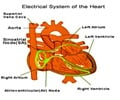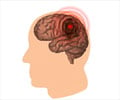Catheter ablation, treatment of the most common heart rhythm disorder, significantly reduces the risk of stroke, mortality, Alzheimer's disease and other forms of dementia,

According to two studies, patients with atrial fibrillation treated with catheter ablation are less likely to develop Alzheimer's disease or other forms of dementia, and have a significantly reduced risk of stroke and death compared to A-fib patients with who are not treated with ablation.
During atrial fibrillation, the heart's two small upper chambers quiver instead of beating effectively.
Blood isn't pumped completely out of them, so it may pool and clot. If a piece of a blood clot in the atria leaves the heart and becomes lodged in an artery in the brain, a stroke results.
Source-ANI
SRM















